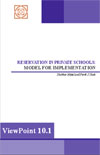| Research |
THE ABCs of SCHOOL CHOICE
Authors: The Friedman Foundation - for Educational Choice, 2014
Abstract: Much current discussion of educational vouchers takes it for granted that their primary aim is to improve education for low-income students in urban areas. That would indeed be one of the effects of the full-fledged adoption of vouchers, and it is certainly a worthy objective, but it is very far from the major objective, at least to this supporter of vouchers.
I have nothing but good things to say about voucher programs…that are limited to a small number of low-income participants. They greatly benefit the limited number of students who receive vouchers, enable fuller use to be made of existing excellent private schools, and provide a useful stimulus to government schools. They also demonstrate the inefficiency of government schools by providing a superior education at less than half the per-pupil cost.
But such programs are on too small a scale, and impose too many limits, to encourage the entry of innovative schools or modes of teaching. The major objective of educational vouchers is much more ambitious. It is to drag education out of the 19th century—where it has been mired for far too long—and into the 21st century, by introducing competition on a broad scale. Free market competition can do for education what it has done already for other areas, such as agriculture, transportation, power, communication and, most recently, computers and the Internet. Only a truly competitive educational industry can empower the ultimate consumers of educational services—parents and their children.
... read more |
| Education News |
| |
Multiple surveys on learning achievement may be a thing of the past
- The Times of India, 05 Feb 2014
The days of multiple surveys mapping the learning achievement of school children based on self-created benchmarks could soon be over with the HRD ministry finalizing exhaustive class-wise learning indicators that students from class I to VIII are expected to achieve. |
1.7 lakh children out of school: Sarva Shiksha Abhiyan survey
- The Hindu, 05 Feb 2014
As many as 1,70,525 children in the State of Karnataka between the age of seven and 14 are out-of-school, reveals the survey carried out by Sarva Shiksha Abhiyan. This includes children who never enrolled and those who have dropped out of school. |
Microsoft Corporation-led group unveils Windows 8.1 tablet for school kids
- Financial Express, 10 Feb 2014
Software giant Microsoft Corporation unveiled specially bundled tablet for private schools in partnership with computer maker Acer, MBD Group and Tata Teleservices in India for Rs 24,999.The tablets will be available to all private schools (K6-12) in India.
|
NCERT makes changes in Hindi textbooks after complaints
- India Today, 11 Feb 2014
National Council for Education Research and Training (NCERT) has come up with some changes in their Hindi textbooks. The amendments have been made as a result of objections received, about its content. A reference regarding the alleged use of derogatory words in Hindi textbooks of Classes I, VI, IX and XI was also received, which has led to this move.
|
British council imparts English training to Mumbai teachers
- The Times of India, 05 Feb 2014
Mumbai's municipal corporation has tied up with the British council to train its teachers on how to impart lessons in English. Municipal commissioner Sitaram Kunte said, "An MOU has been signed with British council for training 9,600 MCGM teachers during next five years starting from 2013-14 to 2017-18."
|
|
|
|
Poll
Does increasing the working hours of teachers translate into better learning outcomes for the children?
To vote click here.
|
|
|
Factoid
As many as 1,70,525 children in the state of Karnataka between the age of 7 and 14 are out-of-school. Source: Sarva Shiksha Abhiyan Survey.
|
|
Publications
 
|
| |
|
|


